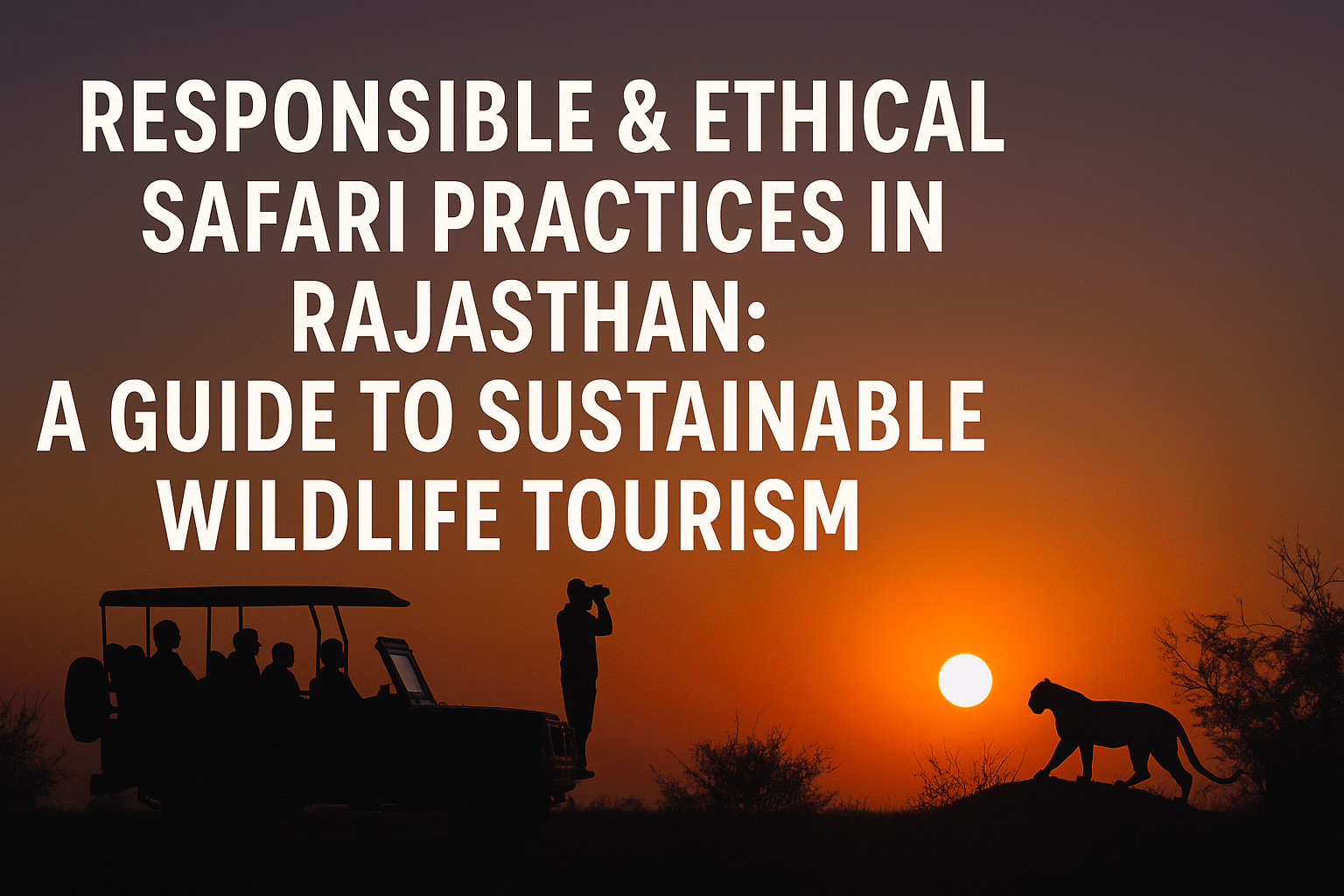- May 26, 2025
Responsible & Ethical Safari Practices in Rajasthan: A Guide to Sustainable Wildlife Tourism
Millions of wildlife enthusiasts from around the globe flock to Rajasthan each year, eager to catch a glimpse of its elusive big cats, vibrant birdlife, and unique desert ecosystems. But with rising visitor numbers comes greater pressure on fragile habitats and local communities. Adopting responsible safari practices in Rajasthan isn’t just good etiquette—it’s essential for conserving the very wildlife we come to admire. In this comprehensive guide, you’ll learn how to minimize your footprint, support community livelihoods, and ensure your next safari is both ethical and unforgettable.
- Why Responsible Safari Practices Matter
- Protecting Wildlife Health: Excessive noise, bright lights, and off-trail driving can stress animals, altering feeding and breeding behaviors.
- Conserving Habitat Integrity: Trampling vegetation, littering, and off-route excursions degrade soil, disturb nesting sites, and accelerate erosion.
- Empowering Local Communities: Ethical tourism channels revenue into community programs—education, healthcare, and women’s self-help groups—in villages bordering parks like Ranthambore, Sariska, and Jhalana.
- Maintaining Park Credibility: Forest departments set strict quotas and code of conduct rules. Safari violations can threaten a park’s ability to offer safari experiences at all.
Keyword: Responsible Safari Practices in Rajasthan

- Understanding Park Guidelines & Regulations
Each protected area in Rajasthan has its own set of rules governed by the state Forest Department. Before you book:
- Verify Permit Validity: Ensure your e-permit covers the correct zone (e.g., Ranthambore Zone 3) and time slot (morning or afternoon).
- Vehicle & Guest Limits: Most parks limit jeeps to six passengers and mandate canter occupancy caps. Exceeding these limits can result in fines and even suspension of safari operations.
- Restricted Zones: Never stray beyond marked trails or into ‘no-entry’ buffer areas—these are critical wildlife corridors.
- Photography Restrictions: Flash photography and drone usage are banned; infrared equipment may be permitted only with prior authorization.
- The Do’s and Don’ts of Ethical Safari Behavior
Do’s | Don’ts |
✔️ Stay seated and silent in the vehicle | ❌ Yell, honk, or make loud noises |
✔️ Follow your guide’s instructions at all times | ❌ Exit the jeep or lean out of windows unless expressly allowed |
✔️ Use binoculars and long-lens cameras to observe from a distance | ❌ Attempt to touch, feed, or lure animals with food |
✔️ Keep windows partially closed to prevent debris and protect wildlife | ❌ Discard plastic bottles, food wrappers, or other litter |
✔️ Photograph with natural light and patience rather than flash or shouting | ❌ Chase animals to get a better angle—let them come to you |
✔️ Respect fellow tourists and maintain a fair distance | ❌ Block other vehicles—move when prompted to ensure everyone gets a chance |
Keyword: Ethical Safari Rajasthan
- Minimizing Your Environmental Impact
- Pack Reusable Essentials: Bring a reusable water bottle, metal cutlery set, and cloth bag. Single-use plastics contribute to micro-litter in remote forest areas.
- Eco-Friendly Sunscreen & Repellents: Choose biodegradable, reef-safe lotions and insect repellents to prevent chemical runoff into waterholes.
- Stay on Designated Trails: Even a few meters of off-trail wandering can crush seedbeds and disrupt small-mammal habitats essential for predators.
- Solar-Powered Gadgets: Charge headlamps and camera batteries via portable solar chargers to reduce dependence on park generators.
- Supporting Local Communities & Conservation Efforts
Rajasthan’s buffer-zone villages are the first line of defense for wildlife corridors. Your safari choices can make a real difference:
- Hire Village Guides: Many ex-forest guards and trained naturalists live in adjacent villages. Booking them ensures both authentic insights and fair wages.
- Opt for Community-Run Homestays: Staying in a local home supports village incomes directly, encourages cultural exchange, and often includes home-cooked Rajasthani meals.
- Buy Handicrafts & Handlooms: Invest in block-printed textiles, leather goods, and silver jewelry sold by tribal artisans. A percentage of profits often funds local schools and health clinics.
- Donate to Verified NGOs: Organizations like Wildlife First and Tiger Watch run livestock insurance programs and anti-poaching patrols; a small contribution helps sustain vital programs.
- Choosing Ethical Safari Operators
Not all safari organizers prioritize sustainability. When researching, look for:
- Green Certifications: Eco-Tourism Society of India (ESOI) or similar accreditations demonstrate adherence to environmental standards.
- Transparent Fee Structures: Operators who clearly break down forest fees, guide charges, and vehicle rentals avoid hidden markups.
- Small-Group Focus: Companies limiting group sizes to four–six guests reduce noise and environmental disturbance.
- Conservation Contributions: A stated percentage of profits reinvested in habitat restoration, anti-poaching units, or community education is a strong ethical indicator.
- Positive Reviews on Responsibility: Guest testimonials mentioning low-impact practices, respectful guides, and community benefits signal a trustworthy operator.
- Case Study: How One Responsible Safari Made a Difference
In 2023, Jaipur EcoSafaris piloted a “Zero-Trace Safari” in Jhalana:
- Solar-Charged Jeeps: They retrofitted three jeeps with solar panels to run spotlights, cutting diesel use by 40%.
- Community Hosts: Each safari included a 30-minute cultural segment at a nearby tribal homestay, supporting six local families per month.
- Plastic-Free Policy: Guests received branded stainless steel water bottles and mesh produce bags for all excursions.
Outcome: Over six months, guest satisfaction scores rose by 25%, and local home-stay revenues increased by ₹150,000—proof that ethical choices can also be profitable.
- Practical Tips & Pre-Safari Checklist
Before you depart, run through this checklist to guarantee a seamless, ethical experience:
- Confirm E-Permit: Print a physical copy and verify zone/time slot accuracy.
- Review Park Rules: Read the official Forest Department code of conduct for your chosen sanctuary.
- Pack Reusables: Bottle, cutlery, cloth bag, biodegradable toiletries.
- Charge Green: Power up devices with solar chargers or power banks.
- Dress Appropriately: Neutral tones, long sleeves, and insect-repellent shirts.
- Download Offline Maps: In areas with weak network coverage, an offline GPS aids navigation and emergency services.
- Learn Local Etiquette: A simple “Namaste” and respect for village customs go a long way in Rajasthan’s rural heartlands.
- Beyond the Safari: Ongoing Stewardship
Responsible tourism doesn’t end when your jeep returns to the lodge:
- Share Ethically: When posting photos on social media, avoid precise GPS tags for sensitive species habitats.
- Provide Constructive Feedback: Send comment cards or online reviews praising operators’ green initiatives, encouraging them to expand these practices.
- Volunteer Virtually: Many NGOs welcome remote assistance—social media outreach, fundraising support, or data entry—providing year-round impact.
- Educate Others: Inspire friends and family by sharing your responsible safari experiences, multiplying the ripple effect.
- Conclusion
By adopting ethical safari practices in Rajasthan, you’re ensuring that the region’s leopards, tigers, cranes, and desert specialists continue to flourish—while uplifting the communities that steward these wild places. From choosing solar-powered jeeps to hiring village guides, every decision you make on safari can leave a lasting, positive legacy.
Disclaimer
This guide to Responsible Safari Practices in Rajasthan is based on regulations, park guidelines, and conservation programs as of May 2025. Permit fees, zone rules, and community initiatives may change; always verify current information with the Rajasthan Forest Department or authorized tour operators before planning your safari. The author and publisher accept no liability for errors, omissions, or any outcomes arising from decisions based on this guide.
Disclaimer All images used in this blog are either sourced from public domain or credited to their respective owners. If you are the copyright holder of any image and wish to request its removal or proper attribution, please contact us at [email protected]














